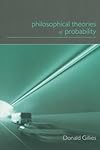
Donald Gillies
Autore di Philosophical Theories of Probability
Sull'Autore
Donald Gillies is Emeritus Professor of Philosophy of Science and Mathematics at University College London, UK.
Opere di Donald Gillies
Opere correlate
Etichette
Informazioni generali
Utenti
Recensioni
Potrebbero anche piacerti
Autori correlati
Statistiche
- Opere
- 12
- Opere correlate
- 1
- Utenti
- 149
- Popolarità
- #139,413
- Voto
- 3.9
- Recensioni
- 2
- ISBN
- 33
- Lingue
- 1

